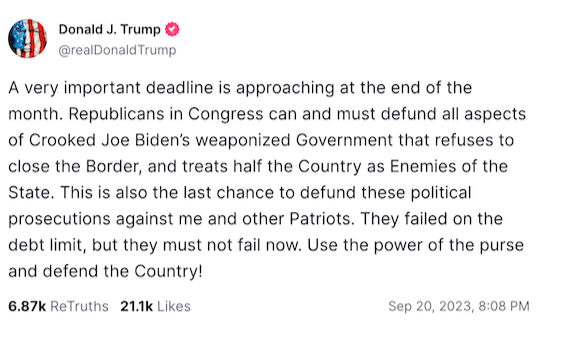I tried waiting until the latest fiasco in the House was over before writing about it. But it won’t end.
It’s like one of those preposterously huge car pile-ups that happens when the weather is just so. In this case, cars have been crashing into each other for a week and they’re going to keep on crashing for another week—at least. If I keep waiting, I might be waiting forever.
So it’s time. The situation is already bad enough that we can safely pronounce it a disaster despite the fact that it’s ongoing.
If you’re trying to grasp the magnitude of this pile-up, this should suffice: Matt Gaetz, perhaps the single most obnoxious MAGA politician in Congress (sorry, Marjorie), is now effectively speaker of the House.
You don’t often find mainstream political media and Steve Bannon arriving at the same political conclusion but there’s really no other conclusion to be had here. Kevin McCarthy spent the past week in a test of wills with Gaetz and a band of other media-friendly populists to determine who had more influence over the Republican legislative agenda.
Gaetz won. And so, having “forfeited control over the House floor,” wrote Semafor’s Jordan Weissmann, McCarthy “already feels a bit like a speaker in name only.”
And you know what? I’m okay with it. One could even argue that the outcome is fortuitous for those who hate what the GOP has become.
It’s the end of the House as we know it, and I feel fine.
I’ll spare you a full play-by-play of what’s been happening in the lower chamber on the assumption that you’ve followed the coverage elsewhere at The Dispatch.
The bottom line is this: With funding for the government set to run out next Sunday, House Republicans can’t find 218 votes among themselves to pass any individual spending bills. Or a comprehensive “omnibus” spending bill. Or a short-term stopgap spending bill (a “continuing resolution” or “CR”) to keep the lights on for a few weeks while they go on negotiating internally.
McCarthy has made concessions to the Gaetz bloc in hopes of bringing them along. On Wednesday night, with input from fiscal conservatives from the House Freedom Caucus, he floated a new CR that would cut spending below the levels he and Joe Biden agreed to last year and include some border security measures and deny any emergency funding for Ukraine. As a special bonus to appease the worst elements in his conference, McCarthy also denied Voldymyr Zelensky’s request to address a joint session of Congress during his trip to Washington this week.
It almost worked. On Thursday, when he called for a vote to move a long-stalled defense bill forward, two members of the Gaetz bloc who were happy with the new CR proposal flipped from no to yes. But it wasn’t enough. With all Democrats voting no, the Gaetz faction remained just strong enough to send the vote down to defeat, an unthinkable humiliation for the leadership.
Business in the House screeched to a halt. Members were sent home for the weekend despite the fact that a politically poisonous shutdown is set to begin in nine days. Afterward, McCarthy sounded like a broken man.
To grasp the full absurdity, understand that nothing that passes the House here stands a chance of passing the Senate. All McCarthy wanted from the defense bill was to prove that he could unite his caucus behind something, strengthening his hand in the negotiations to come with the Senate and the White House. If there’s to be a shutdown, Republicans desperately want the public to see it as a dispute between the two parties over how much spending is responsible so that Democrats end up sharing some of the blame. Instead we’re on track for a shutdown driven entirely by a disagreement between two wings of the Republican Party.
And no one seems to know what one wing, the Gaetz wing, actually wants. Including Kevin McCarthy.
In fairness to Gaetz, he would say that he simply wants McCarthy to keep the promises he made to conservatives at the start of this year when he won their votes for speaker. McCarthy pledged that the GOP would eschew messy omnibus bills and CRs during his tenure; rather, they would follow regular order by passing a series of individual appropriations bills targeted specifically at discrete government priorities (defense, agriculture, etc.). He hasn’t kept that promise. And Gaetz and his bloc are refusing to let him off the hook for it by capitulating to a last-second CR.
After the vote to move the defense bill failed on Thursday afternoon, Gaetz showed up at McCarthy’s office and called on him to keep his promise after all. Next week, he told the speaker, let’s vote on a series of individual bills—defense, homeland security, state-foreign operations, and agriculture. There’s practically zero chance that those bills will pass in time to avert a shutdown, but no matter. The House Rules Committee promptly announced that it’ll take up defense, homeland security, state-foreign operations, and agriculture next Friday.
Matt Gaetz, speaker of the House, had dictated the agenda.
Everyone loves regular order. Gaetz’s insistence on appropriating funding via individual spending bills is commendable in the abstract. But the wrinkle, notes lobbyist Liam Donovan, is that those bills would have and could have moved months ago if not for obstruction by … some of the same Freedom Caucus types who are now complaining about governing by CR.
There’s also the small matter that even devout fiscal conservatives approved of the CR that McCarthy proposed on Wednesday. Chip Roy, arguably the most outspoken deficit hawk in the House, actually helped negotiate the bill with moderate Republicans—only to watch the Gaetz bloc blow up the process on Thursday by screeching that CRs are unacceptable in principle.
"If a Republican opposes a 30-day, 8% cut to the non-defense, non-veteran federal government with the best border security bill we've ever had attached to it, I honestly don't know what to say to my fellow Republicans other than you're gonna eat a s--- sandwich, and you probably deserve to eat it," Roy told Fox News Digital. Bon appetit.
If Chip Roy siding with Kevin McCarthy against Matt Gaetz in a fiscal debate isn’t weird enough for you, the weirdest figure in the party also entered the fray with a post on Truth Social on Wednesday night:

There’s nothing in there objecting to CRs or demanding regular order, you’ll note. (I doubt Trump could tell you even at this late date what “CR” is an abbreviation for.) And Republicans couldn’t defund Jack Smith’s federal prosecution of Trump even if they wanted to, as fellow Freedom-Caucus-er Byron Donalds reminded Gaetz this week.
Which leaves one with the distinct impression that this gambit by Trump and the Gaetz bloc is, like so much of populist politics, less about achieving any particular policy end than merely demonstrating a willingness to “fight”—and lose.
We all know how this standoff ends, after all. The government will be funded, and the funding levels will be entirely unacceptable to right-wing populists. Eventually either McCarthy or moderate Republicans acting on their own (more on that below) will be forced to make a deal with House Democrats that ends up cutting fiscal conservatives out of the process. Trump and Gaetz will have achieved nothing of substance.
But politically they’ll have achieved plenty. If you understand populism as the practice of nurturing endless grievances against an “establishment” and demagoging those grievances to your own advantage, the two have played this perfectly. Once McCarthy and/or the RINOs are left with no choice but to reach a bipartisan compromise, MAGA types will howl that they’ve “sold out” again. McCarthy might lose his speakership because of it, particularly if Trump ends up calling for his ouster. Either way, it’ll be treated as another reason we need the great man back in the White House so that he can drain the swamp that he utterly failed to drain during his first four years as president.
A mature way to cope with divided government is to accept that you won’t be able to force major policy reforms on your opponents. (All the more so if your opponents control two of the three institutions that collaborate on legislation.) One would think Republicans would have learned that lesson in 2013, when Tea Partiers like Ted Cruz forced a shutdown to reflect the dopey populist belief that they could compel Democrats to defund Obamacare if only they “fought” long enough.
It didn’t work. It won’t work this time either. Populism doesn’t “mature.”
All of which, I realize, makes it sound like I disapprove of what Trump and Gaetz are doing. Not so! To the contrary.
There are plenty of benefits to having Speaker Gaetz run the House into the ground and end up as the face of the coming shutdown.
One small benefit is that it should make his chances of winning higher office somewhat longer.
It would be good for the country to have him out of politics. Gaetz is a talented demagogue, after all, the most articulate and charismatic member of the “Joker caucus” in the House. He’s skilled at media and obviously willing to engage in political stunts with serious policy repercussions to advance his populist “brand.” I’d love to tell you that his antics this week will end up hurting him in the Republican primary if he runs for governor of Florida in 2026, but, well, you read this newsletter every day. You know the truth about that.
If I were Byron Donalds, who’s also eyeing a run for governor in Florida, I’d be worried that Gaetz and I are on opposite sides of the current CR standoff and that my side is the one that doesn’t want to watch the world burn.
Still, being known as the guy who was so hellbent on a shutdown that even people like Chip Roy concluded he was nutty can’t be helpful to Gaetz in a statewide general election. It may be impossible for a Republican to lose in Florida in the near future (gulp), but between his obstructionism and a personality that’s off-putting to everyone to the left of Marjorie Taylor Greene, he stands a better chance of fumbling away a gimme than most in his party do.
Another benefit of Speaker Gaetz is that he might—might!—finally alienate moderate Republicans to the point that they grow a pair and end the hostage crisis that’s prevailed in the House GOP conference for more than a decade.
You know how that goes. Some policy proposal is floated, 80 percent of House Republicans promptly agree on it, then the leadership sighs and goes hat in hand to the Freedom Caucus to beg for the remaining votes needed to get them to 218. Populists often end up exercising a de facto veto over broadly popular measures, triggering a crisis that ends unhappily in one of two ways. Either the populists relent reluctantly as the crisis becomes politically toxic or they stand their ground and force the leadership to beg Democrats for an underwhelming bipartisan compromise to solve it.
In both cases, Republican voters end up disillusioned with their party while Democratic voters come away exasperated at endless cycles of right-wing “hostage-taking.” That’s a bad combination for moderate House Republicans representing swing districts.
At some point, one would think, the moderates would get fed up and declare that the Freedom Caucus isn’t the only Republican bloc capable of throwing its weight around. Perhaps we reached that point this week. Here’s Mike Lawler, a freshman from New York:
Dana Milbank rounded up some choice quotes about Republicans’ performance—all from Republicans themselves. “Clowns.” “Foolishness.” “Weak.” “Lunatics.” “Disgraceful.” “New low.” “Pathetic.” There are more.
There’s no downside I can see to normie Republicans developing rich new feelings of contempt for Gaetz and the MAGA Joker caucus.
Lawler and another New York freshman, Marc Molinaro, warned that if their own caucus can’t agree on a CR, they’re willing to consider signing a Democratic discharge petition to force a floor vote on a “clean CR” that would fund the government with no strings attached. A discharge petition at this point would almost certainly come too late to avert a shutdown, as there are procedural niceties that must be satisfied before it reaches the floor. But after the shutdown begins, such a petition could plausibly end it.
It would take just five moderate Republicans to sign on in order to make it happen. That would be tremendously risky politically—the voters of this party are plenty nihilistic enough to replace the Lawlers and Molinaros with unelectable MAGA Republicans as nominees in the next House elections—but it’s worth noting that Speaker Gaetz is worried about it. “The threat is that five liberal or moderate Republicans say, ‘We don’t want to do the single subject bills,’” he explained on Thursday night. “So we’re just going to go sign what’s called a discharge petition and then just move that thing like s— through a goose.”
Moderate Republicans are in the same position in the House as traditional conservatives are in the larger GOP. They’ve allowed populists to take their institution hostage because, when push comes to shove, the populists are willing to shoot that hostage while they themselves are not. Lawler and Molinaro would be doing the country a service by shooting it in this case, moving a discharge petition to teach the Gaetz bloc a hard lesson that hostage-taking won’t be tolerated.
“Congress has … to contend with the reality that a small but meaningful minority of its members have a vision of their jobs that abjures core legislative work as illegitimate,” Yuval Levin wrote on Thursday, marveling at how different the incentives are for the Gaetz bloc than for traditional members of Congress. Moderate Republicans have it in their power to sideline that minority and remind the country what the federal legislature is for, if they’re willing to risk their jobs to do so.
As does Kevin McCarthy. Making a deal with Democrats on a bipartisan CR would put his job at risk too, of course, but ending the hostage crisis could work out better for him than he expects. Just as it could for swing-district reps like Lawler and Molinaro whose constituents might be grateful at their efforts to keep the government open for business.
There’s one more reason to like the idea of Speaker Gaetz. If you agree with Tom Nichols and me that the prospect of a Trump restoration is a de facto national emergency, it can only be a good thing for Trump’s party to blunder its way into an unpopular shutdown that it owns lock, stock, and barrel.
Shutdown politics are unpredictable. Despite the Cruz-led episode in 2013, Republicans cleaned up in the midterms the following year. Trump’s approval took a tumble during the shutdown in the winter of 2018-19 but had recovered by March. He nearly won reelection. Voters have short memories.
But.
The surprisingly weak Republican performance in last year’s elections, especially by MAGA candidates, suggests that some meaningful share of the public already doesn’t trust a populist-dominated GOP to govern responsibly. Trump egging on the Gaetz bloc to hold the line on government funding for a reason as blatantly corrupt as interfering with the federal cases against him won’t help the party’s image in that regard. Nor, of course, will the fact that Gaetz is arguing not against Joe Biden and Chuck Schumer but against Kevin McCarthy and Chip Roy. I’m not sure we’ve ever experienced a shutdown that can be laid squarely at the feet of a single party.
And so I don’t know if the public’s ambivalent reaction to previous shutdowns will hold this time.
Maybe worst of all for Republicans, a shutdown for which they bear sole responsibility will complicate the party’s attacks on Biden if we end up in a recession next year. That’s an issue that the GOP will understandably want to hang entirely around the necks of Democrats, but if it’s preceded by a protracted shutdown—particularly a shutdown that’s widely viewed as having been instigated by Republicans—then that issue becomes cloudy. But for the House GOP’s refusal to fund the government, would the recession have happened?
If not, it’s not exclusively “Biden’s recession,” is it?
That’s what Gaetz and his enablers are risking for the sake of proving that nothing, including the federal government going dark, will deter them from “fighting”—and losing. Populist Republicans positively love losing, as the current presidential primary polling affirms; “being betrayed confirms that they are right to be intransigent,” as Levin memorably puts it. Fortunately, the rest of the country doesn’t feel the same way. Inasmuch as Speaker Gaetz ends up reminding them of what he and his party currently represent, he’s doing his part to avert the national emergency. Thanks, Matt.







Please note that we at The Dispatch hold ourselves, our work, and our commenters to a higher standard than other places on the internet. We welcome comments that foster genuine debate or discussion—including comments critical of us or our work—but responses that include ad hominem attacks on fellow Dispatch members or are intended to stoke fear and anger may be moderated.
With your membership, you only have the ability to comment on The Morning Dispatch articles. Consider upgrading to join the conversation everywhere.